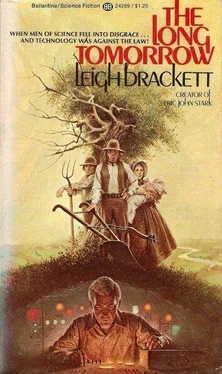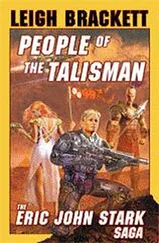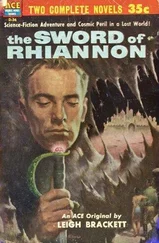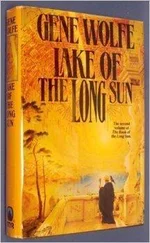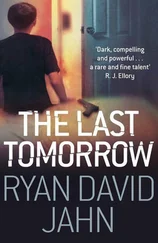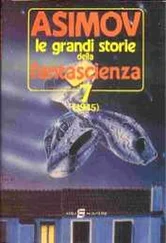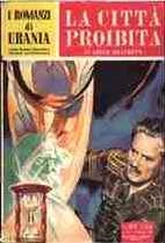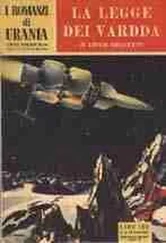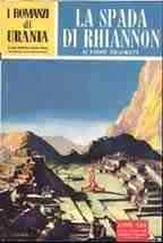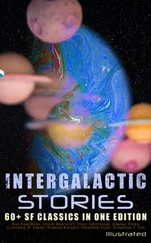Behind it is the reactor.
Behind it is evil and night and terror and death.
A voice screamed in Len’s ears, the voice of the preaching man, standing on the edge of his wagon with the sparks flying past him on the night wind— They have loosed the sacred fire which only I, the Lord Jehovah, should dare to touch— and God said— Let them be cleansed of their sin—
Esau’s voice spoke in shrill denial. “No. There ain’t any more of that left in the world.”
Let them be cleansed, said the Lord, and they were cleansed. They were burned with the fires of their own making, yea, and the proud towers vanished in the blazing of the wrath of God, and the places of iniquity were made not—
“You’re lying,” Esau said. “There ain’t any more of that, not since the Destruction.”
And they were cleansed. But not wholly—
“They’re not lying,” Len said. He backed slowly away from that staring wall of concrete. “They saved it, and it’s there.”
Esau whimpered. Then he turned and ran.
Hostetter caught him. He spun him around and Sherman caught his other arm and they held him, and Hostetter said fiercely, “Stand still, Esau.”
“But it’ll burn me,” Esau cried, staring wild-eyed. “It’ll burn me inside, and my blood will turn white and my bones will rot and I’ll die.”
“Don’t be a fool,” said Hostetter. “You can see it hasn’t hurt any of us.”
“He’s got a right to be afraid of it, Ed,” said Sherman, more gently. “You ought to know their teaching better than I. Give them a chance. Listen, Esau. You’re thinking of the bomb. This isn’t a bomb. It isn’t hurtful. We’ve lived with it here for nearly a hundred years. It can’t explode, and it can’t burn you. The concrete makes it safe. Look.”
He let go of Esau and went up to the shield and put his hands on it.
“See? There’s nothing here to fear.”
And the devil speaks with the tongues of foolish men and works with the hands of the rash ones. Father, forgive me, I didn’t know!
Esau licked his lips. His breath came hard and uneven between them. “You go and do it too,” he said to Hostetter, as though Hostetter might be of a different flesh from Sherman, being a part of the world that Esau knew and not solely of Bartorstown.
Hostetter shrugged. He went and put his hands on the shield.
And you, thought Len. This is what you wouldn’t tell me, what you wouldn’t trust me with.
“Well,” said Esau, choking, hesitant, sweating and shaking like a frightened horse but not running now, standing his ground, beginning to think. “Well—”
Len clenched his icy fists and looked at Sherman standing against the shield.
“No wonder you’re so afraid,” he said, in a voice that did not sound like his own at all. “No wonder you shoot people if they try to leave. If anybody went out and told what you’ve got here they’d rise up and hunt you out and tear you to pieces, and there wouldn’t be a mountain in the world big enough to hide yourselves under.”
Sherman nodded. “Yes. That’s so.”
Len shifted his gaze to Hostetter. “Why couldn’t you have told us about this, before we ever came here?”
“Len, Len,” said Hostetter, shaking his head. “I didn’t want you to come. And I warned you, every way I could.”
Sherman was watching, intent to see what he would do. They were all watching, Gutierrez with a weary pity, Erdmann with embarrassed eyes, and Esau in the middle of them like a big scared child. He understood dimly that it had all been planned this way and that they were interested in what words he would say and how he would feel. And in a sudden black revulsion of all the hopes and dreams and childhood longings, the seeking and the faith, he shouted at them, “Wasn’t one burning of the world enough? Why did you have to keep this thing alive?”
“Because,” said Sherman quietly, “it wasn’t ours to destroy. And because destroying it is the child’s way, the way of the men who burned Refuge, the way of the Thirtieth Amendment. That’s only an evasion. You can’t destroy knowledge. You can stamp it under and burn it up and forbid it to be, but somewhere it will survive.”
“Yes,” said Len bitterly, “as long as there are men foolish enough to keep it going. I wanted the cities back, yes. I wanted the things we used to have, and I thought it was stupid to be afraid of something that was gone years and years ago. But I never knew that it wasn’t all gone—”
“So now you think they were right to kill Soames, right to kill your friend Dulinsky and destroy a town?”
“I—” The words stuck in Len’s throat, and then he cried out, “That isn’t fair. There was no atom power in Refuge.”
“All right,” said Sherman reasonably. “We’ll put it another way. Suppose Bartorstown was destroyed, with every man in it. How could you be sure that somewhere in the world, hidden under some other mountain, there wasn’t another Bartorstown? And how could you be sure that some forgotten professor of nuclear physics hadn’t hoarded his textbooks—you had one in Piper’s Run, you said. Multiply that by all the books there must be left in the world. What chance have you got to destroy them all?”
Esau said, slowly, “Len, he’s right.”
“Book,” said Len, felling the blind fear, feeling the crouching of the Beast behind the wall. “Book, yes, we had one, but we didn’t know what it meant. Nobody knew.”
“Somebody, somewhere, would figure it out in time. And remember another thing. The first men who found the secret of atomic power didn’t have any books to go by. They didn’t even know if it could be done. All they had was their brains. You can’t destroy all the brains in the world, either.”
“All right,” cried Len, driven into a corner and seeing no escape. “What other way is there?”
“The way of reason,” said Sherman. “And now I can tell you why Bartorstown was built.”
There were three levels in Bartorstown. They climbed now to the middle one, below the laboratories and above the cavern where the old evil hid behind its concrete wall. Len walked ahead of Hostetter, and the others were all around him, Esau still trembling and wiping his mouth over and over with the back of his hand, the Bartorstown men silent and grave. And Len’s mind was a wild dark emptiness like a night sky without stars.
He was looking at a picture. The picture was on a long curving piece of glass taller than a man and lit from inside someway so that the picture was like real, with depth and distance in it, and color, and every tiny thing sharp and clear to see. It was a terrible picture. It was a blasted and fragmented desolation, with one little lost building still standing in it, leaning over as though it was tired and wanted to fall.
“You talk about the bomb and what it did, but you never saw it,” said Sherman. “The men who built Bartorstown had, or their fathers had. It was a reality, a thing of their time. They put this picture here to remind them, so that they wouldn’t be tempted to forget their job. That was what the first bomb did. That was Hiroshima. Now go on, around the end of the wall.”
They did, and Gutierrez was already ahead of them, walking with his head down. “I’ve already seen them too often,” he said. He disappeared, through a door at the end of a wide passageway that had more pictures on either side. Erdmann started after him, hesitated, and then dropped back. He did not look at the pictures either.
Sherman did. He said, “These were some of the people who survived that first bombing, after a fashion.”
Esau muttered, “Holy Jesus!” He began to shake more violently, hanging his head down and looking sidelong out of the corners of his eyes so as not to see too much.
Читать дальше
